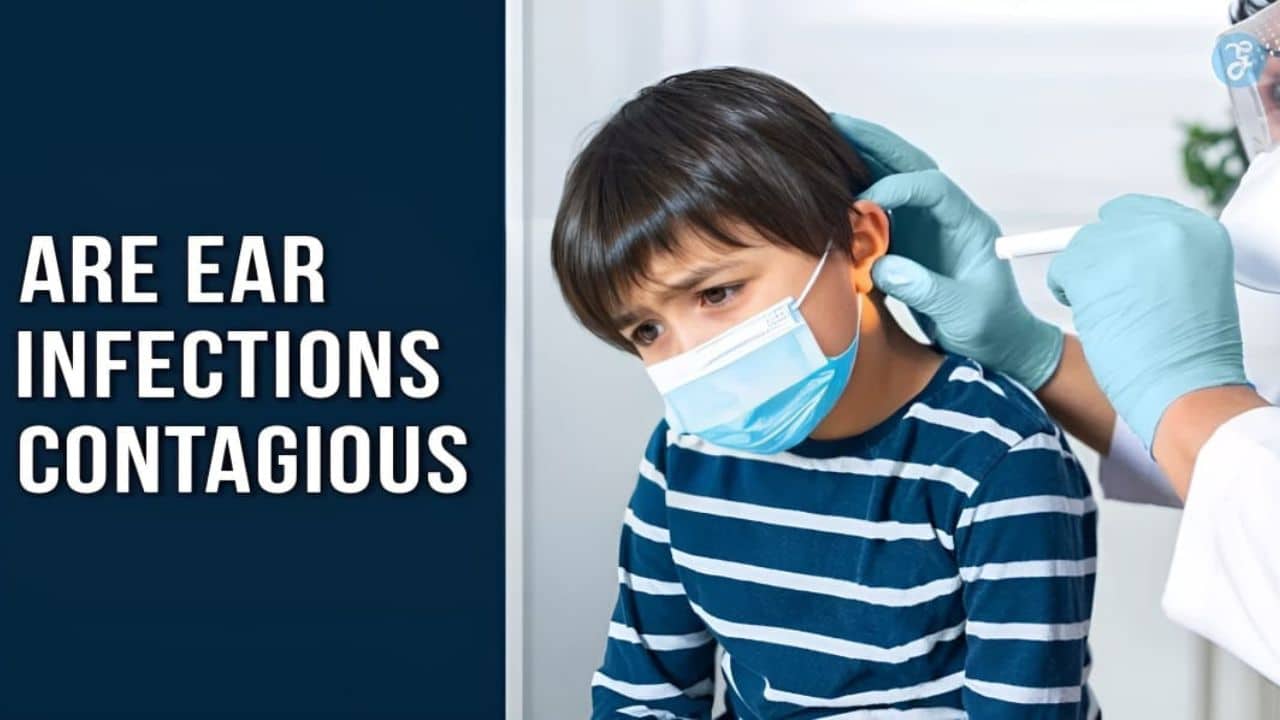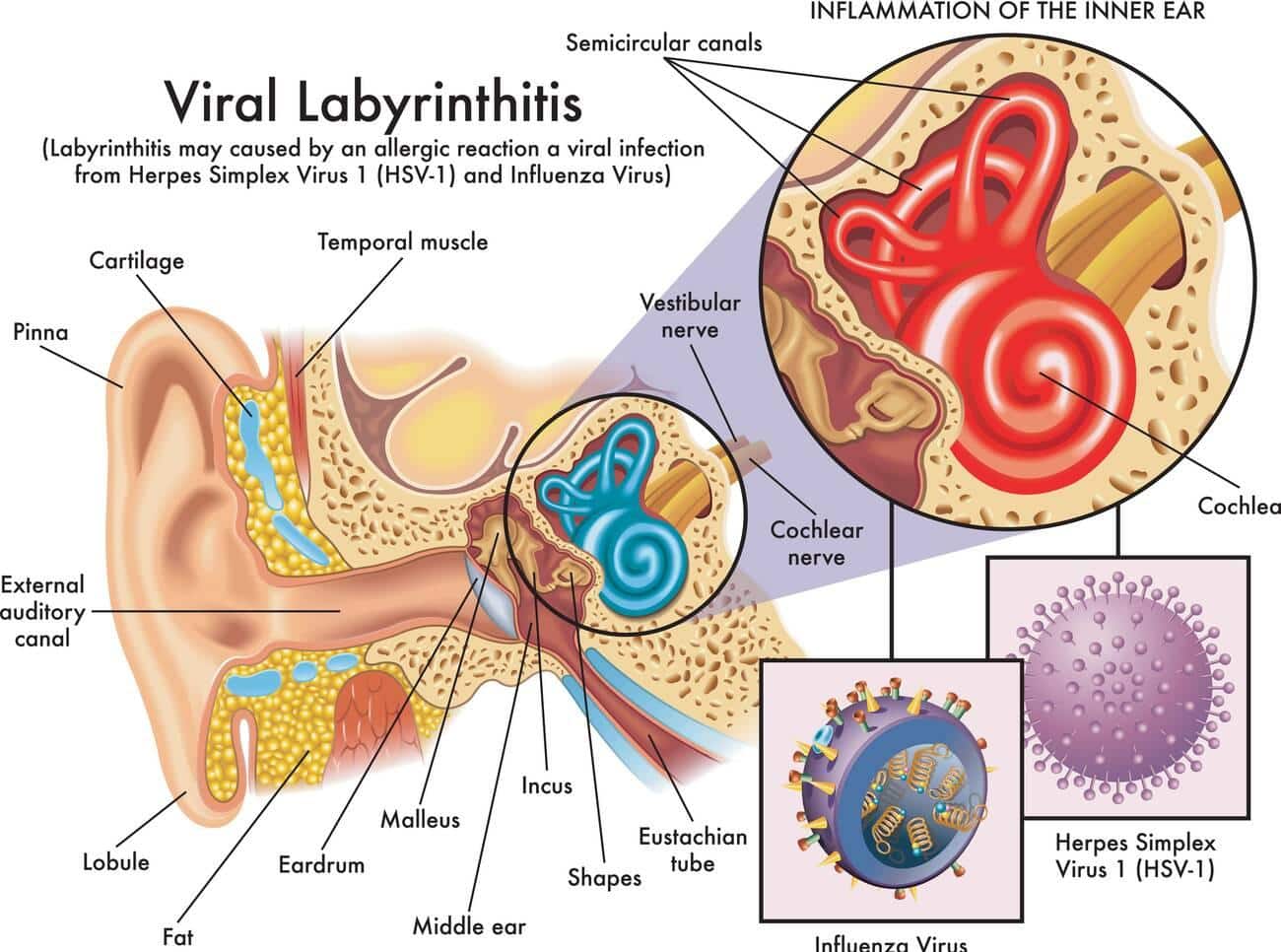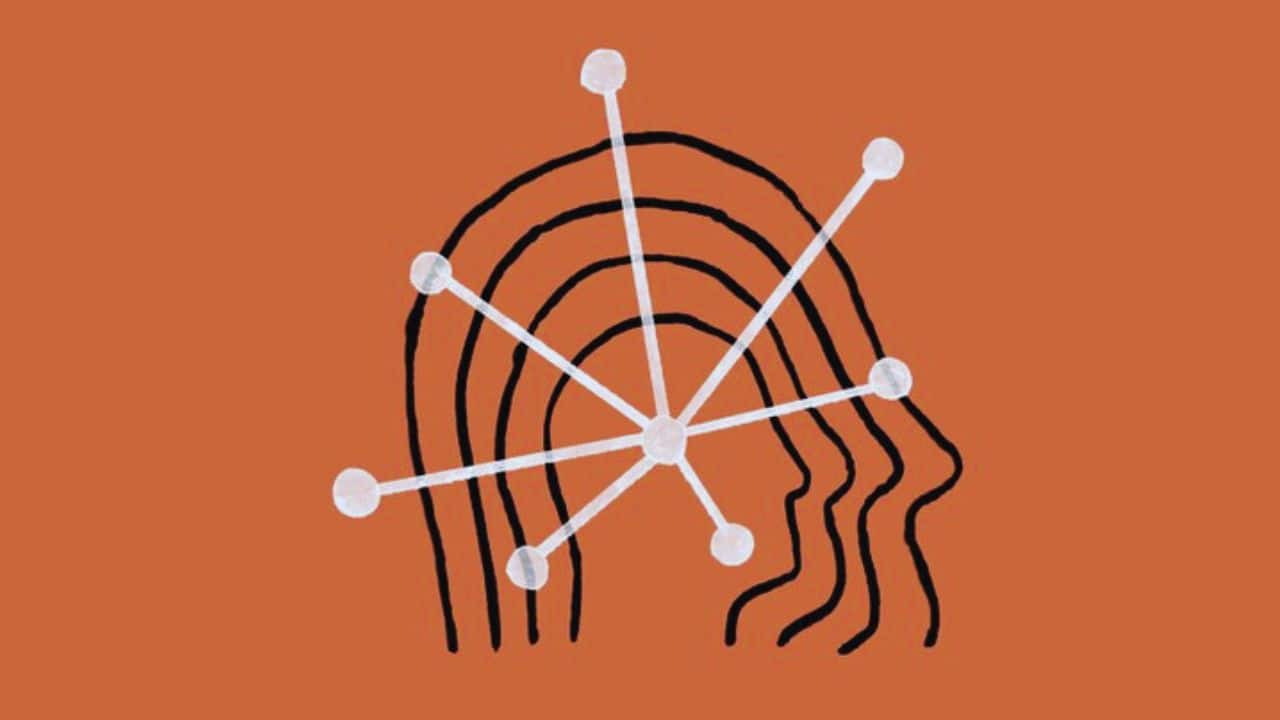Ear infections are not contagious. A bacterial or viral infection in the middle ear usually causes an ear infection. Pain in the ear is the most common sign of an ear infection.
Even though ear infections can happen to adults, they happen more often to children. Often, ear infections go away on their own. In more severe cases, they may need to see a doctor.
So, are ear infections contagious? Ear infections are not contagious, but the cold or flu, which can cause them, is. Ear infections can happen during or after a cold or an infection that is easily spread. Because of this, some wonder if ear infections can spread to others.
Let’s talk about the question, “Are Ear Infections Contagious?” Everything you need to know about them, like what causes them, what kinds there are, and how to treat them.
What is an Ear Infection?
A virus or bacteria called an ear infection can cause the middle ear to swell up. Most of the time, it affects young children, but adults can also get them. Pain, fever, and drainage from the ear can be signs. Most of the time, pain and inflammation are treated with antibiotics or over-the-counter medicines.
Sometimes, you may need to talk to a specialist about how to treat the problem further. To avoid getting an ear infection, you should avoid people who are sick, wash your hands often, and don’t share things with others.
Read More: Invention of Antibiotics
Types of Ear Infections
To correctly diagnose and figure out how nasty the ear infection is, you need a lab test, an analysis of the pus or discharge that has built up, and a thorough physical exam. Sometimes, a CT scan is needed to determine what’s wrong.
There are many different kinds of ear infections. Here is a list:
- Acute mastoiditis
- Vestibular neuronitis
- Herpes zoster of the ear
- Otitis externa
- Otitis media – acute or chronic
- Serous otitis media
- Infectious myringitis
What Causes Ear Infections?

An ear infection is an infection caused by bacteria or a virus right behind the eardrum. Swelling and fluid build-up can make you feel bad and hurt.
Fluid builds up in the middle ear when the Eustachian tube gets swollen or blocked. Many things can cause swelling or blockage, such as:
- Common colds
- Sinus infections
- Excess mucus
- Seasonal Allergies
- Smoking or exposure to cigarette smoke
- Swollen adenoids
- Air pressure changes
- Climate or altitude changes
Children are more likely to get ear infections than adults because their eustachian tubes are smaller and shorter. After ages 4 or 5, this risk tends to go down.
What are the Common Symptoms of Ear Infections?
Some signs of an ear infection are:
- Ear discomfort
- Ear pain
- Fluid drainage from the ear
- Muffled hearing
- Sore throat
- Fever
- Change in hearing
- Balance problems
How Do Ear Infections Develop?
The Eustachian tubes are a pair of thin tubes that run from the middle ear to the back of the throat, usually behind the nasal passages. Their main jobs are to keep the air pressure in the middle ear at the right level, drain normal secretions from the middle ear, and bring fresh air into the ear.
When there is a food allergy, an infection in the upper respiratory tract, or inflammation of the tubes, the body makes too much fluid, which builds up in the middle ear and makes it a good place for bacteria to grow. Other symptoms like swelling and pain appear when bacteria or viruses cause an infection. This is usually due to more inflammation.
Children are more likely to get ear infections because their Eustachian tubes are more horizontal and narrow, making it harder for fluid to drain and making it more likely to get clogged.
When infections happen, they are taken care of quickly. But sometimes, it takes longer for the infection to go away, which can cause long-term infection. This could eventually cause the eardrum to burst and pus to come out.
Are Ear Infections Contagious?
Ear infections don’t spread to other people. But the viruses and bacteria that cause ear infections can spread from one person to another. Ear infections come in three forms:
- External ear infection: This is commonly called “swimmer’s ear.”
- Labyrinthitis is inflammation of the inner ear, sometimes caused by infection.
- Middle ear infection: This is also known as otitis media. It’s the most common form of ear infection, specifically in children.
Ear infections are usually caused by germs or viruses in the middle ear. Things like the common cold or flu could cause this. Some of these diseases are very easy to spread. They can spread from one person to another or from one surface to another.
Influenza, in particular, spreads when people talk, sneeze, or cough and make droplets. You could get the virus if you swallow or breathe in infected droplets. This could make you more likely to get an ear infection.
Are Outer Ear Infections Contagious?
Acute otitis externa, an outer ear infection, can be caused by several things, but none are contagious.
The main thing that makes you more likely to get an outer ear infection is irritation of the ear canal. This happens when dirt or water gets into the ear canal. This ear infection is often called “swimmer’s ear” because it tends to happen after swimming. So it makes sense that swimming in dirty water could cause an infection in the outer ear.
Bacteria most likely cause an outer ear infection, but a fungal infection or a virus could also cause it.
How Long Do Ear Infections Last?
Most ear infections are mild, so you might not need antibiotics to help you feel better. In this case, the problem usually goes away after a few days to a few weeks. But the infection can come back in the future. Acute ear infections don’t last long and go away on their own.
But some inner ear infections can last for several months or even years. When this happens, it’s called having a chronic ear infection. Chronic conditions can cause damage to the eardrum and foul-smelling pus to come out of the ears. Infections that last too long can make it hard to hear and change how you talk.
Related Read: How to Get Water Out of Your Ear
Treating an Ear Infection
Many ear infections get better on their own without having to see a doctor. Your doctor may want to monitor your symptoms for a week or two to see if they get better.
Doctors usually tell parents of younger children with mild ear pain to watch for symptoms for no more than 48 hours.
If your symptoms don’t improve, your doctor may tell you to take antibiotics or use ear drops (for external ear infections). Surgery may be needed to drain fluid from the middle ear in cases that are more severe or last for a long time.
How to Cure an Ear Infection Naturally?
Many people have heard that keeping the ears clean, using cotton swabs dipped in water and hydrogen peroxide, and not touching the ears can help prevent ear infections. Use warm water and salt to rinse the area. Keeping a jar of sea or kosher salt in the bathroom is beneficial. It’s cheap and easy to get, and its minerals can kill bacteria and ease pain.
Another way is to squeeze an olive between two fingers and rub it on the infected area. This will help get rid of the infection and drain the fluid. A simple home remedy is to mix a few drops of lemon juice into a cup of warm water and leave it on the infected area overnight. There are many ways to treat an ear infection, but this one works well.
When to See a Doctor?
If you have pain in your ear or a fever, both signs of an ear infection, you should see a doctor. The doctor will look inside the ear with an otoscope to find out what’s wrong. They are looking for a red, swollen, or inflamed eardrum that may be infected.
They may also use a pneumatic otoscope, which is a tool that lets them blow a small amount of air on the eardrum to check for fluid buildup in the middle ear. If there is fluid in the ear, the eardrum won’t be able to move back and forth as easily as when there is no fluid buildup.
Other infections or illnesses cause most ear infections, so doctors usually look for signs of an upper respiratory infection by listening to your breathing and checking your throat and nose.
Read More: Types of Health Insurance
What Should I Do About an Ear Infection?
If you’ve only had ear pain for a few days and nothing else, you don’t need to go to the doctor immediately. Since many ear infections go away independently, your doctor will probably want to see how the symptoms change before prescribing medicine.
In the meantime, try to get as much rest as you can. The immune system strengthens when you sleep, which helps the body fight off infections and other illnesses.
If the ear infection hurts or makes you feel bad, there are things you can do to treat it at home. A warm compress is one of the easiest ways to stop the pain. Just soak a washcloth in warm water, wring out the extra water, and hold it against the infected ear for up to 20 minutes. If it helps, use the compress again and again during the day.
If your child is older than 3 months, you can also give them over-the-counter painkillers like acetaminophen (Tylenol). Just make sure you give them the right amount for their age. If you have questions, contact your doctor or nurse line.
You May Find Interest: How to Pop Your Ears
How Can You Prevent an Ear Infection?
You can stop ear infections from happening by taking a few simple precautions. Some of these are washing your hands often, staying away from people who are sick, and not smoking. Also, babies may be less likely to get ear infections if breastfed. If your child has a cold or the flu, keep their head up while sleeping and moisten the room with a humidifier.
Make sure to take all the antibiotics your doctor prescribes for as long as he or she says to. Lastly, vaccinating against common diseases like the flu can also help lower the chance of getting an ear infection.
Is an Ear Infection Viral or Bacterial?
Either viruses or bacteria can cause ear infections. An ear infection is common after a cold or other respiratory infection. If they had a viral infection, likely, the ear infection is also viral. The same goes for bacterial infections.
Viral and bacterial infections can also spread to the middle ear through the adenoids, which are pads of tissue at the back of the nose. As a part of the immune system, adenoids are essential for responding to viruses and bacteria that pass through the body. But sometimes, they can trap these contagions, and because they are close to the opening of the eustachian tubes, they can cause an infection in the middle ear.
Also, when the adenoids get bigger, they can close the eustachian tubes because they are so close to them. If the eustachian tubes are blocked, fluid can’t drain and will build up.
Final Words
In the end, ear infections do not spread by themselves. Are ear infections contagious? They can be caused by bacterial and viral infections that can spread, so it’s essential to take steps to keep them from happening. An ear infection can cause pain and discharge from the ear, fever, and trouble sleeping. Antibiotics and pain and inflammation-relieving drugs can be used as treatments.
If you think your child has an ear infection, you should take him or her to the doctor immediately. Inner ear infections are less common than outer ear infections and can cause more severe problems, like hearing loss. But, with the right diagnosis and treatment, these can often be dealt with.
Frequently Asked Questions (FAQs)
Check some commonly asked questions on the topic – are ear infections contagious?
Is there any home remedy to treat ear infections?
Ear infections can be treated at home in several ways, such as using warm or cold compresses, putting olive oil, ginger extract, garlic extract, and a hydrogen peroxide solution in the ear canal, and doing neck exercises.
Can ear infections spread to the brain?
Meningitis is a very rare but very dangerous complication of a middle ear infection. This can happen if the infection gets to the outer layer of the brain and spinal cord, which protects them (the meninges). Meningitis can cause symptoms like a severe headache.
Can you treat an ear infection without antibiotics?
Without antibiotics, many ear infections get better in a few days. Because of this, many doctors recommend a “watchful waiting” plan before giving antibiotics.
Why do children get more ear infections than adults?
Children are more likely than adults to get ear infections because their immune systems aren’t strong enough to fight off bacteria and viruses. Also, their Eustachian tubes are smaller and flatter than adults, making it hard for fluid to drain out of the ear. It causes fluid to build up in the Eustachian tubes, making them more extensive and more likely to cause ear infections.
Can you ignore an ear infection?
If you don’t do anything, your eardrum could burst. This could cause you to lose your hearing, so make sure to get help right away.
Can I treat an ear infection myself?
Yes. You can do many things on your own to treat an ear infection. The best way to do this is to let a few drops of hydrogen peroxide sit in your ear for a few minutes before rinsing it with distilled water. However, you should talk to your doctor first.
How do you catch an ear infection?
When fluid with viruses or bacteria gets stuck in your ear, it causes the eustachian tubes to swell up. This is how ear infections start. Most of the time, ear infections are caused by other illnesses that make your ears and throat stuffy. However, ear infections could also be caused by the water you swim or bathe in.
Should I stay home with an ear infection?
Most ear infections go away in about 3 days, but they can also be signs of other illnesses. If you have a fever, you should stay at home.
When is an ear infection severe?
If you have any of the following signs, you should go to the hospital immediately: Ear pain with or without a fever. Itching in or around the ear canal or ear. Hearing loss or hearing trouble in one or both ears.
What are the 3 types of ear infections?
Different ear infections exist, such as otitis externa and acute or chronic otitis media. Serious ear infection.
Are ear infections a big deal?
The Mayo Clinic says that most ear infections don’t cause long-term problems, but repeated infections that aren’t treated can cause serious problems. Ear infections often cause mild hearing loss because of swelling and/or fluid buildup. However, hearing loss usually goes away when the infection does.
Why are ear infections so painful?
When fluid behind the eardrum gets infected, usually with bacteria, this is called an ear infection. When this happens, the tube that leads into the body gets blocked, and fluid builds up behind the eardrum. The increased pressure pushes the eardrum outward, which causes pain and fever.
Disclaimer: This content is for informational purposes only and does not replace professional medical advice, diagnosis, or treatment. This information is not comprehensive and should not be used to make health or well-being decisions. Consult a qualified healthcare professional with questions about a medical condition, treatment options, or health regimen. This website or the content should never replace professional medical advice.









































